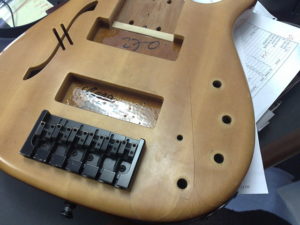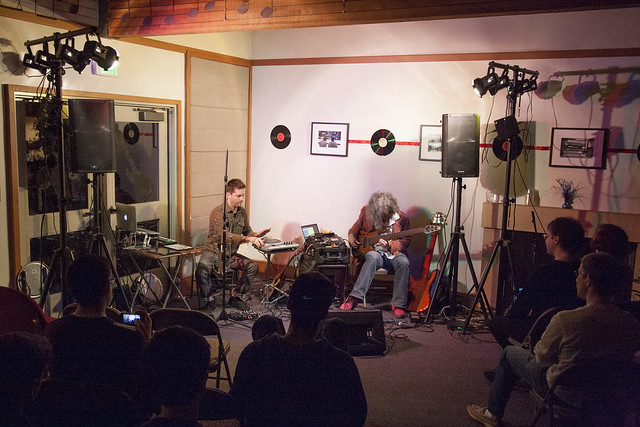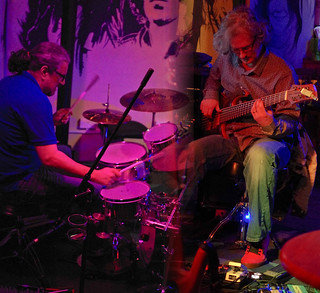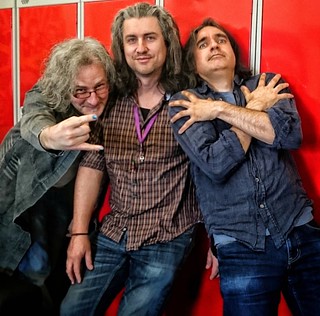Decades are interesting markers in time. 10 years – however boring or eventful – is a MASSIVE chunk of any one person’s life. You change, whether you want to or not. The world around you changes. People are born and die, kids become adults, people who could previously see their youth over their shoulder are now glimpsing retirement and old age on the horizon. And whatever your work is, you do A LOT of it.
For musicians, 10 years is unfathomable. Careers are often shorter than that. Untold numbers of legendary musicians have died, and people who were pre-teen at the start of the decade are in rehab dealing with the ravages of years of toxic fame by the end of it.
10 years is enough time to become an AMAZING musician from scratch. If it’s your life, your calling, your passion, and you haven’t progressed, something has gone WAY wrong… It may be that you got trapped in the economics of playing other people’s music for decent money, built a life around that and couldn’t then afford the time and focus to work on your own thing. It could be that teaching became an option, and as is so often – tragically, and mistakenly – the case, you lost sight of yourself as an artist, as a creative entity. I see that a lot, and it breaks my heart… Or it could be that you made something beautiful, and spent 10 years being told that that one thing was going to be The Thing, and it held you back, hanging all your hopes and dreams on the one thing… There are loads of ways that people get lost in time, and for musicians, the commercial context is a veritable Temple Of Doom of traps and pitfalls.
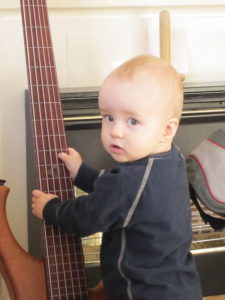 So what of my own decade? Well, it started – monumentally – with a one month old baby. Flapjack was born during the dying embers of the previous decade, and obviously cast our entire lives in a new light. But I still entered the decade with dreams of spending my life playing music with Lobelia – our house concert show was pretty damn great by that point. Two solo sets, a bunch of stuff together at the end mixing her songs and cool covers (before that become the Kudzu weed of YouTube 🙂 ) – we had an amazing show, and I dreamed of us touring as a lil’ family building our mini-traveling-circus, even talking about home-schooling Flapjack half the year so we could tour more… What became clear many years later was that that was never going to work – it was way harder on Lo than on me, and despite two really successful summers spent touring with a baby in tow (and a godsend of a mother-in-law making it all possible), as the early years of the 10s progressed, we had to let go of touring together…
So what of my own decade? Well, it started – monumentally – with a one month old baby. Flapjack was born during the dying embers of the previous decade, and obviously cast our entire lives in a new light. But I still entered the decade with dreams of spending my life playing music with Lobelia – our house concert show was pretty damn great by that point. Two solo sets, a bunch of stuff together at the end mixing her songs and cool covers (before that become the Kudzu weed of YouTube 🙂 ) – we had an amazing show, and I dreamed of us touring as a lil’ family building our mini-traveling-circus, even talking about home-schooling Flapjack half the year so we could tour more… What became clear many years later was that that was never going to work – it was way harder on Lo than on me, and despite two really successful summers spent touring with a baby in tow (and a godsend of a mother-in-law making it all possible), as the early years of the 10s progressed, we had to let go of touring together…
We also started the decade living in London, but again, escaping became more and more inevitable as the cost of being there was ever more starkly out of step with the kind of life we wanted to lead. So, thanks to a one-off incredible gig in Thailand, we were able to afford to make the leap to Birmingham, kicking off a whole load of work with Andrew Dubber and New Music Strategies, and a bunch of other work looking at social media in the arts, charities and the 3rd sector… stuff that was WAY less precarious than being two full-time musicians with a baby…
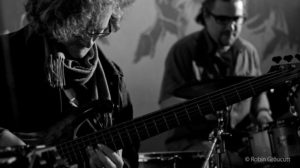 The first massive change after that came when Andy Edwards rang me out of the blue and offered me a teaching job at Kidderminster College. I hadn’t taught weekly in a college for well over a decade, and wasn’t at the time looking for that, but the social media work with Amplified was slowing, and the opportunity to start to develop some of the New Music Strategies ideas in a college setting was a good one… I wasn’t aware at the time how much of the rest of the 10s it would influence, but it ended up being transformative, and my musical relationship with Andy became one of the most significant of my entire life.
The first massive change after that came when Andy Edwards rang me out of the blue and offered me a teaching job at Kidderminster College. I hadn’t taught weekly in a college for well over a decade, and wasn’t at the time looking for that, but the social media work with Amplified was slowing, and the opportunity to start to develop some of the New Music Strategies ideas in a college setting was a good one… I wasn’t aware at the time how much of the rest of the 10s it would influence, but it ended up being transformative, and my musical relationship with Andy became one of the most significant of my entire life.
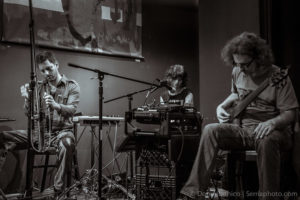 Talking of significant musical relationships, a chance invite online to play some music with a Californian multi-instrumentalist called Daniel Berkman was the other great transformation of the early 10s… Daniel and I met to both play solo on a gig, but immediately decided to play improvised duo material for the entire show, and over the next three Januarys did, I think, 27 shows, the first 10 of which were released in their entirety, and set off a path towards bringing together performing, recording and releasing music that stepped WAY outside the normal economic and temporal constraints of the recorded music economy… Daniel also sowed the seeds that grew into the decision to start using percussion, keyboard sounds and field recordings in my music, that was eventually sparked by a collaboration with Divinity Roxx in 2015.
Talking of significant musical relationships, a chance invite online to play some music with a Californian multi-instrumentalist called Daniel Berkman was the other great transformation of the early 10s… Daniel and I met to both play solo on a gig, but immediately decided to play improvised duo material for the entire show, and over the next three Januarys did, I think, 27 shows, the first 10 of which were released in their entirety, and set off a path towards bringing together performing, recording and releasing music that stepped WAY outside the normal economic and temporal constraints of the recorded music economy… Daniel also sowed the seeds that grew into the decision to start using percussion, keyboard sounds and field recordings in my music, that was eventually sparked by a collaboration with Divinity Roxx in 2015.
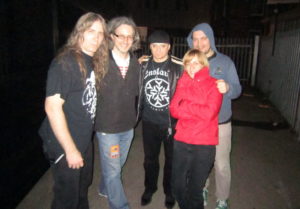 The third great musical moment of the early decade was meeting Chris Thorpe, and then Lucy Ellinson and forming Torycore – Torycore was initially inspired by the three of us going to see Cannibal Corpse and Triptykon in Birmingham (the night I met Lucy) and from there, she came up with the idea for using the visceral rage and anger of metal as an amplifier of the brutality and evil at the heart of the politics of Austerity. As an instrumentalist whose rationalisation for his music had always been deeply political, it was an amazing release to get to do something so explicitly focused on social justice, a performance that became incredibly significant to a whole lot of people trying to make sense of the death and destruction at the heart of the Tory Decade Of Austerity. We were seeing people die, people made homeless and services for the poor and disabled decimated, by people in suits smiling and talking in posh accents about difficult choices. True Compassion Means Tough Decisions. It was bullshit, and Torycore allowed us to give voice to that rage, by taking their words and putting them in context. It also threw me into a world of theatre makers and performers who had a HUGE influence on the next step for me – the start of my PhD.
The third great musical moment of the early decade was meeting Chris Thorpe, and then Lucy Ellinson and forming Torycore – Torycore was initially inspired by the three of us going to see Cannibal Corpse and Triptykon in Birmingham (the night I met Lucy) and from there, she came up with the idea for using the visceral rage and anger of metal as an amplifier of the brutality and evil at the heart of the politics of Austerity. As an instrumentalist whose rationalisation for his music had always been deeply political, it was an amazing release to get to do something so explicitly focused on social justice, a performance that became incredibly significant to a whole lot of people trying to make sense of the death and destruction at the heart of the Tory Decade Of Austerity. We were seeing people die, people made homeless and services for the poor and disabled decimated, by people in suits smiling and talking in posh accents about difficult choices. True Compassion Means Tough Decisions. It was bullshit, and Torycore allowed us to give voice to that rage, by taking their words and putting them in context. It also threw me into a world of theatre makers and performers who had a HUGE influence on the next step for me – the start of my PhD.
Having first talked about doing a PhD in 2010 at Leeds Beckett Uni, in 2015 the conversation got a little more serious just at the time that a number of galvanising conversations made it clear that my focus was actually about the intersection of improvisation as a practice, as a method of music-making, and the experience of audiences. I was fascinated by how aesthetics and expectations and experiences came together around music made in the moment, about familiarity, responsiveness and indeed the theatricality of performance in that context. So that became the PhD project. And I’m still at it 5 years on, the idea still as inspiring as ever but the work harder and more complex than it really should’ve been thanks to a bunch of interruptions along the way…
Meeting Andy Edwards span off into a ton of collaborative improv settings. He’d been out of open/free improv for a long time, so creating space for him to discover that, and for me to get right back into playing with an incredible drummer was a marriage made in musical heaven. We started to play with our incredible colleague Phi Yaan-Zek as LEYlines and also did a bunch of other collaborative improv shows and put improvisation at the heart of the course at Kidderminster. My music life has Andy’s fingerprints all over it, but I’m still not going to start listening to Zappa 😉
At the start of 2010, I’d JUST started to sell music on Bandcamp – it was a very new platform, but looked to be way more artist-friendly, and it didn’t take me long to realise that it was the *perfect* platform for me and what I wanted to build. Releasing the albums with Daniel Berkman on there, the option for us both to release music, for Artemis to compile albums of the vocal tracks and release them too… that portability of music seemed so much better attuned to what the art was meant to be and meant to DO. And then in 2015 I was invited to trial Bandcamp’s subscription platform. Three artists (I think) got to try it first before everyone else, to iron out kinks and see how it worked. And for me it was another line in the sand. This was exactly what I needed, to completely step off the album/promo/sales cycle and be able to release all of these amazing live collaborative recordings in a way that accumulated value through being prolific rather than diluting or decimating the commercial viability of any one recording… It was 180 degrees away from the economics of streaming, of trying to have a ‘hit’ track on a playlist, or trying to second guess commercial viability. Nope, give it to the audience, let them decide, hand them agency over it, tell stories about it and build a community of practice where the audience are able to invest in what’s going on not just by buying finished work but by funding the entire project, but talking about it, but encouraging the bits they particularly enjoy, but asking questions about the stuff they don’t understand… A transactional approach to the accumulation of social value in the recordings themselves… (see, PhD 😉 )
Back to 2015, and that project with Divinity – after a number of conversations and a rough plan to improvise and do shows with a lot of story-telling, we got together for a week, recorded some ideas and did an amazing freewheeling show at Kidderminster College… And after it, I realised that the way Divi used a keyboard to play beats (woven into her Beatboxing!) was the next thing I needed to explore in my own music. So I got hold of a Quneo – an instrument I’d first heard Daniel Berkman use a couple of years earlier – and start to build their influence into how I played as a solo artist. Keeping the principle and practice of improvisation for and with that particular audience, but playing beats and keyboard parts on the Quneo, and seeing where that lead. It changed everything for me, and over time I started to feed it into the improv duets and into LEYlines… It was a massive change in terms of the range of sounds I could produce, and how obvious the hip hop influence is on my music, but the process and performance brain has remained pretty much the same…
Eventually, my Kidderminster job came to an end – to make more time for my now-massively-behind-schedule PhD – and by route of a couple of other teaching jobs in between, I’ve ended up teaching one day a week at BIMM in Birmingham and LOVING it. A new and amazing bunch of colleagues, though I can’t ever imagine anything replicating the creative energy of making music with Andy and Phi (LEYlines is still very much a thing!)
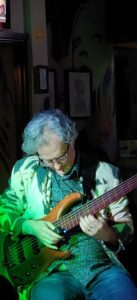 I finished the decade with the 20th anniversary of my first solo gig, Flapjack’s 10th birthday, and the 5th anniversary of my Subscription starting. A whole lot of time to reflect and look back. I am, at least from where I’m stood, making the best music of my life, and other than the constant stress of the PhD (such is PhD life, I guess) I’m doing pretty well. I have projects lined up for the new year, a number of things recorded but still to release and some other stuff I want to try out. I’m cycling again after 20-something years out of the saddle, and that’s meant I’m WAY fitter going into this decade than coming into the last one… Life is good.
I finished the decade with the 20th anniversary of my first solo gig, Flapjack’s 10th birthday, and the 5th anniversary of my Subscription starting. A whole lot of time to reflect and look back. I am, at least from where I’m stood, making the best music of my life, and other than the constant stress of the PhD (such is PhD life, I guess) I’m doing pretty well. I have projects lined up for the new year, a number of things recorded but still to release and some other stuff I want to try out. I’m cycling again after 20-something years out of the saddle, and that’s meant I’m WAY fitter going into this decade than coming into the last one… Life is good.
10 years is a long time in music gear too! By the end of the decade, I’d changed amp brand (to Aguilar), String brand (to Dunlop) main effects processor (to MOD Devices) and perhaps most noticeably had an incredible new signature bass with Elrick Basses. My obsession with individual pedals grew massively over the decade, and my pedal collection grew with it…
Across the decade I released somewhere around 56 albums, not including compilations and remasters (I’m not 100% sure how many it is!) with the rate increasing massively after the advent of the subscription. If you’re not yet subscribed, you REALLY need to hop aboard!
So, everything has changed. I went from a single brilliant and highly developed musical focus (touring and recording with Lo) to this incredibly rich music making life, from playing solo bass to making music with controllers, basses and a mountain of pedals, from normal gigs to theatre shows with Torycore, from doing masterclasses in colleges to writing courses and hopefully finishing up a PhD soon…
A decade is a long time. A lot happened. Take stock, look forward, and leave the past behind while committing to putting right anything that is your responsibility to fix (I HATE the idea that these arbitrary rites of passage give us license to abandon the mess we created! I’m still dealing with mine from the last decade, forgiveness doesn’t mean abandoning others to our consequences…) – but build systems and support groups, communities and patterns of behaviour that’ll help you break cycles that were destructive in the last decade, that will drag you from the inertia, the traps that hold us, and the missed opportunities to help others. Make sure your resolutions include an outward look to how you can best influence and serve your community… artistic types are terrible for obsessing over our own work but our ‘work’ needs to include fixing the world we’re writing about and responding to. Commit to get your hands dirty, then go home and make art that illuminates it all.
Here’s to brighter days and much more music xx
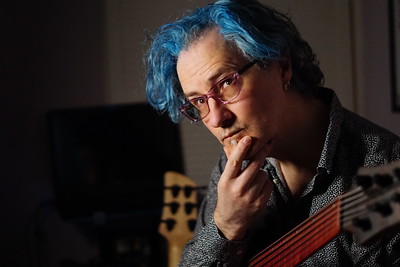 A few thoughts on this YouTube subscriber swap thing that’s going around… (in case you’ve missed it a LOT of musicians have been promoting the idea that we should reciprocally follow one another to help reach the 1000 subscriber limit so we can start monetising YouTube channels, and then play each other’s videos on mute to gain revenue)Â
A few thoughts on this YouTube subscriber swap thing that’s going around… (in case you’ve missed it a LOT of musicians have been promoting the idea that we should reciprocally follow one another to help reach the 1000 subscriber limit so we can start monetising YouTube channels, and then play each other’s videos on mute to gain revenue)Â 
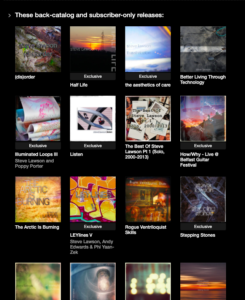





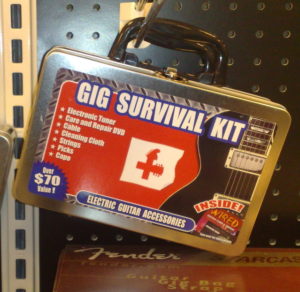
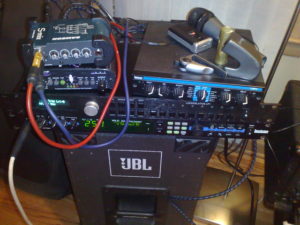 My current studio/live set-up (they’re the same) is the process of 26 YEARS of upgrades. In fact, I started 32 years ago with a borrowed distortion pedal, worked out what I could do with that, and moved on from there. My first album was recorded on Minidisc with an external mic – because THAT’S WHAT I HAD. I could’ve complained and waited til I could afford studio time, but the music wasn’t going to wait. I spent HOURS learning how best to position the mic, I sat with my friend Jez while he mastered it in the very first version of ProTools LE, getting him to explain everything he did so I could learn from that. My 2nd solo album was recorded into a trial version of Soundforge (hint – not designed as a recording program, at ALL!) via a Soundblaster gaming card. because THAT’S WHAT I HAD. My looping set-up changed over time, swapping things out, trading them in – I have multiple albums recorded with a broken (only worked in mono) DL4, and later on with a broken (produced intermittent weird digital glitches, and only worked in mono!) Looperlative, because THAT’S WHAT I HAD. I kept the same basses for decades because I didn’t expect new toys to fix problems that only practice could deal with.
My current studio/live set-up (they’re the same) is the process of 26 YEARS of upgrades. In fact, I started 32 years ago with a borrowed distortion pedal, worked out what I could do with that, and moved on from there. My first album was recorded on Minidisc with an external mic – because THAT’S WHAT I HAD. I could’ve complained and waited til I could afford studio time, but the music wasn’t going to wait. I spent HOURS learning how best to position the mic, I sat with my friend Jez while he mastered it in the very first version of ProTools LE, getting him to explain everything he did so I could learn from that. My 2nd solo album was recorded into a trial version of Soundforge (hint – not designed as a recording program, at ALL!) via a Soundblaster gaming card. because THAT’S WHAT I HAD. My looping set-up changed over time, swapping things out, trading them in – I have multiple albums recorded with a broken (only worked in mono) DL4, and later on with a broken (produced intermittent weird digital glitches, and only worked in mono!) Looperlative, because THAT’S WHAT I HAD. I kept the same basses for decades because I didn’t expect new toys to fix problems that only practice could deal with.